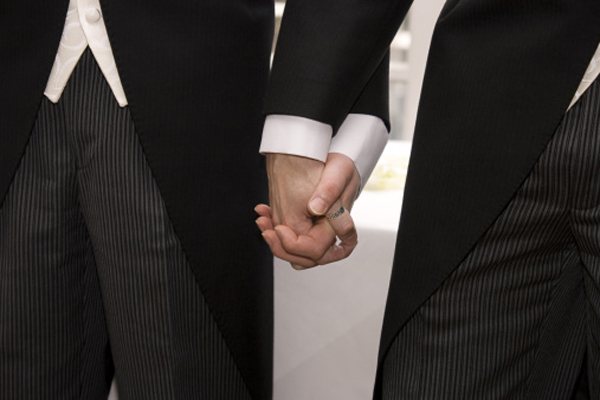The Episcopal Diocese of Western Massachusetts Will Bless Gay Couples
 Photo via Thinkstock
Photo via Thinkstock
“I now pronounce you man and husband.” It’s a phrase rarely heard inside the walls of churches throughout the U.S. The idea of performing same-sex marriages has many religious denominations butting heads over what the Bible says, what Jesus truly wants, and whether the country is “going the way of Sodom and Gomorrah because of homosexuality.” (Hint: It’s not.)
It’s unsurprising, though, that the issue continues to heat up among religious communities, because it comes at a time when gay rights have taken a front seat in American life. The most obvious sign of this prominence is Obama’s recent endorsement of marriage equality, marking a monumental point in presidential history. Citizens themselves are showing an increasing support of gay marriage as well, according to a report from the Center for American Progress, which concluded that marriage equality has become a mainstream value. There are, of course, the negative moments, too, like North Carolina’s approval of Amendment 1 in May, banning same-sex marriage and civil unions.
But while it’s easy to get wrapped up in the hatred flowing from pulpits across the nation (thank you for that disgusting little tirade, Pastor Harris), attention should also be paid to the victories made within churches, no matter how small the victory may be.
Last week, the Episcopal Diocese of Western Massachusetts announced that, beginning in December, it will allow clergy to bless gay couples. The change was made official after this month’s General Convention of the Episcopal Church in Indianapolis, during which a large majority voted in approval of the new rite blessing same-sex relationships. What makes this victory one of smaller size, however, is that the diocese will continue to forbid clergy to actually perform gay weddings — something that their Eastern Massachusetts counterpart gave the green light on in 2009.
Though the diocese may be confined to a mere blessing, the announcement is still significant because it symbolizes progress. And God knows (no pun intended) we need all the progress we can get. What’s more, Bishop-elect Douglas Fisher, who will replace Bishop Gordon Paul Scruton in December, sees the change as “a big move in the right direction,” and, taking a cue from Eastern Massachusetts, plans to discuss the approval of gay marriage within the diocese once he arrives. (The Western diocese is known to be more conservative than the Eastern.)
In the same article reporting the diocese’s announcement, there is a reaction from Hinsdale resident Stephanie Mansfield, who isn’t entirely impressed by the blessing rite. Mansfield, 71, married her wife in an Episcopalian church in the Berkshires last year, but had to bring in an out-of-state friend to officiate the wedding because of the clergy’s inability to do so. She sees the announcement as an “incomplete victory,” and awaits the day that congregations can make their own decisions on same-sex marriages. I agree with Mansfield that this isn’t a total success, but for now, I’d rather focus on the positive.
The announcement may only be a small leap toward future acceptance, but with the number of conflicting views among Episcopalians regarding marriage equality (most delegates from the Diocese of South Carolina walked out of the General Convention, appalled by the rites passed), it’s still an impressive feat. One can easily undermine an announcement like this, thinking, “Yeah OK, but they still can’t get married. Big deal.” And while it’s obviously disappointing that equality isn’t present in the Western diocese just yet, compare the Convention’s decision to, say, the Catholic Church’s complete opposition to homosexual behavior and relationships, and, suddenly, things seem a bit less bleak.
No, it’s not a complete victory. Yes, there’s more work to be done. But, honestly, it’s just nice to hear religious figures wanting to bless gay couples and not banish them to an electrified pen where they’ll eventually die off. Bishop Fisher is right: this is a step in the right direction. And, with any luck (or common sense), we will continue to put one foot in front of the other.


